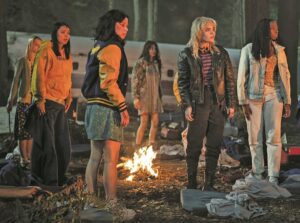Picks by Independent staff and contributors
Thanksgiving might be all about tradition, but that doesn’t mean you need to get stuck in a viewing rut. If you’re looking for something to watch over the long holiday weekend besides yet another game of sportsball with Cousin Jim and the gang — or if you just need a diversion to help avoid encroaching seasonal affective disorder — here are some of the Independent staff’s current streaming suggestions and obsessions.
Mo, Netflix

It’s not often that you find a protagonist swigging cough syrup and sampling his mama’s olive oil all in the span of 10 minutes. But Mo isn’t your typical leading man. He’s an undocumented Palestinian refugee who refuses to audition for your sympathy; a resident of Houston, Texas who mocks cowboy hats and slips between Arabic, Spanish, and a slight Southern twang with ease; and a one-time strip club bouncer who can’t handle the smell of cigarettes. The show never stays where you expect it to. It’s an Atlanta-esque hero’s journey combined with a breadth and depth of familial relationships that’s akin to — dare I say it? — The Sopranos. One moment you’re literally sobbing at the memory of Mo’s family’s expulsion from Palestine, and the next you’re cackling at his asylum lawyer’s live-in spiritual guide. If you sneak off from Thanksgiving dinner to watch the show, you’ll probably gulp down five episodes in one sitting. —Olivia Oldham
Yellowjackets, Showtime

In the past couple of years, Yellowjackets is the only show that’s managed to hold my attention. Usually, if I’m watching television, I’m on my phone at the same time, congratulating myself for the intellectual triumph of completing the day’s Wordle. But Yellowjackets — which follows a high-school girls’ soccer team after a plane crash in the Ontario wilderness, like a feminist retelling of Lord of the Flies — reminded me that art is about escaping into realities that are often more embodied and immediate than the increasingly hazy one we currently occupy.
The first scene of the series lets us know that the girls are going to resort to cannibalism. From there, Yellowjackets follows two timelines: the period in 1996 between the plane crash and the teammate-eating, and 2021, when four survivors, now middle-aged, worry that the truth about what happened in the woods will come out. As the show progresses, the cannibalism ends up being something of a red herring. The ordinary problems the survivors deal with — infidelity, alcoholism, the pressures of public life, the lingering effects of adolescent insecurities — are written and acted with such verisimilitude that they become more horrifying than the grilling and sautéing of corpses. By splicing the timelines together, Yellowjackets seems to say that life is brutal whether you’re stranded in the wilderness or existing in polite society. To get through it, you gotta eat. —Paul Sullivan
American Vandal (Season 1), Netflix

American Vandal’s incredible first season follows high school burnout Dylan Maxwell (Jimmy Tatro), who is accused of spray-painting phalluses on a parking lot full of teachers’ cars, and fellow student and wannabe filmmaker Peter Maldonado (Tyler Alvarez), who believes that Dylan is not guilty. Peter decides to create a Serial-esque true-crime documentary to prove his classmate’s innocence. But instead of being about murder, it’s about … well, penises. As stupid as this concept sounds, American Vandal manages to skewer the genre it parodies while also being a perfect example of it. It features some of the best-written high-school dialogue on TV, making each scene into A-grade sketch comedy.
The mystery at its core is genuinely compelling, too. Its plot twists and turns while eschewing cheap shocks. With each revelation, the mystery deepens as the thematic core of the show becomes clearer; it concludes with a finale that is as funny as it is satisfying, thoughtful, and surprisingly heartbreaking. And at a total runtime of four-and-a-half hours, it’s dangerously bingeable.
As its layered ending unfolds, American Vandal makes you realize that you’ve been laughing so hard you never noticed just how smart it is. (Just make sure to stop after the first season. The second is an unrelated story that lacks the depth and consistency of the first.) —William von Herff
Hotel Portofino, PBS

I need a show to have very specific elements to consider it bingeworthy. It should be a period drama, preferably set between or during the two world wars. There should be a mix of wealthy and less fortunate but deserving characters striving to break through society’s attempts to keep the classes separate, particularly in the bedroom. A nod to the LGBTQ communities must be present, and racial diversity is crucial.
On paper, Hotel Portofino satisfies all my demands. The PBS series is about a British family in the 1920s that owns and operates a hotel in the titular Italian resort town. But the show is a mess. Subplots fizzle out. I can never remember the characters’ names. The lead role of hotel proprietress Bella Ainsworth, played by Natasha McElhone, is vague and underdeveloped. The primary villain is unclear — it’s either Bella’s loutish ex-husband or the local Mussolini stand-in. Both make a lot of threats but nothing of consequence happens. The diversity of the cast feels like inorganic pandering. Worst of all, hardly anyone is getting laid — isn’t impending doom supposed to make everyone super horny?
Nonetheless, it’s become the show I most look forward to watching. It’s just okay enough. Here’s hoping that in this season’s final two episodes at least some of those fancy costumes end up on the floor. —James Judd
Creamerie, Hulu

On first glance, Creamerie is your archetypal virus-wipes-out-swath-of-population-and-leaves-the-rest-to-mourn-and-recover story. All men have been eliminated by a bloody plague. Everyone else must make do. The Auckland countryside makes for a scenic backdrop to the viral ravaging.
Eight years later, Jaime (JJ Fong) is running a dairy farm, supplying her man-free community with milk. Even though time has passed since the pandemic and leafy trees grow from grassy burial heaps, Jaime is still grieving her husband and son. She runs her homestead with her sister-in-law, Alex (Ally Xue), and best friend, Pip (Perlina Lau). That those two can’t stand each other is a reliable comedic plot point.
At first, the area’s political authority is a laughingstock, too. Its governing body enforces a doctrine that appears to be what would happen if probiotic green drinks and yoga mats took on political stature. Its leader — blond, athleisure-clad, and skin-crawlingly sincere — has tough jobs, like announcing the results of the pregnancy lottery that decides on the next round of mothers to carry the government’s reserve of sperm. What initially seems like a comedic mirage of yogini authority gone too far or the autocracy of Lululemon, devolves into something sinister. I won’t spoil it, but it’s worth mentioning that whoever titled the show is a genius. —Sophie Mann-Shafir
Welcome to Plathville, Discovery+ and Max

My streaming habits have mostly settled into an endless cyclical rewatch of The Sopranos and Mad Men, both of which I usually watch by myself so I won’t have to deal with questions like “What happened to the Russian in the woods?” and “Why did they keep recasting Bobby Draper?” from any viewing companions who are watching them for the first time. But when I want to switch things up, I tend to go for something that’s the complete opposite of peak television. Which is why I recently sat through nearly 40 episodes of Welcome to Plathville — a show I’d never heard of it until a promo for it showed up on my Max home screen — while recuperating from surgery. (I’m blaming the painkillers for my lack of discernment.)
The TLC reality series follows the low-stakes dramas of an impossibly blonde family of nine homeschooled siblings in rural Georgia as they grow up and get out into the world and encounter things like tequila and secular music. Somehow it’s lasted for five seasons, and in all those years the plot lines never seem to evolve beyond which sibling isn’t on speaking terms with which parent or other sibling. It’s pleasantly bland and undemanding in the best way possible, and a perfect antidote to anything too rich or spicy you might be watching or eating this holiday season. —John D’Addario



